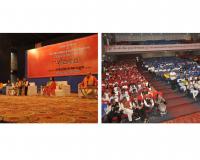10 Female Indian Authors and Their Works You Need to Read Before You Die

New Delhi (India), June 21: India boasts a vibrant and diverse literary scene, with its female authors leading the charge in crafting stories that resonate deeply with readers around the globe. These authors tackle a wide array of themes, from the intricacies of human relationships and personal identity to the broader societal issues and historical contexts that shape contemporary India. Through their evocative prose and compelling narratives, they offer profound insights into the multifaceted nature of Indian culture, addressing topics such as gender roles, family dynamics, political strife, and the immigrant experience.
The following list introduces you to 10 remarkable female authors whose works not only enrich the literary world but also provide an essential understanding of the rich land of Indian life and thought.
1. Sudha Murty: A philanthropist and chairperson of the Infosys Foundation, Murty’s simple yet impactful books focus on Indian values, ethics, and social issues. Three Thousand Stitches (2010) is a collection of inspiring stories based on real-life experiences.
Why Read Her: Murty’s optimistic stories celebrate the power of human connection and the importance of social responsibility.
2. Arundhati Roy: A literary titan, Roy’s debut novel, The God of Small Things (1997), is a hauntingly beautiful exploration of forbidden love and the consequences of social constraints. Her fiery essays tackle political and social injustices, making her a powerful voice for change.
Why Read Her: Roy’s prose is lyrical and evocative, transporting you to the heart of her stories. Her unflinching portrayal of social issues sparks critical reflection on the world.
3. Jhumpa Lahiri: A master of the short story, Lahiri’s Interpreter of Maladies (1999) delves into the immigrant experience with poignant honesty. Her later novels, like The Namesake (2003), explore themes of identity, belonging, and the complexities of family relationships.
Why Read Her: Lahiri’s writing is subtle yet deeply moving. Her characters grapple with universal questions, making them relatable to readers everywhere.
4. Chitra Banerjee Divakaruni: A professor and award-winning author, Divakaruni explores themes of identity, family dynamics, and the immigrant experience. The Mistress of Spices (1997) is a magical realist novel that blends Indian mythology with a contemporary American setting.
Why Read Her: Divakaruni’s imaginative storytelling and focus on cultural intersections offer a unique perspective on the world.
5. Rachana Shah: A motivational speaker, talk show host and writer, Shah’s works address music, fables, and social issues marginalized communities face. Her books ‘On Stage with Lata and Swarlata explore the life and work of musical giant Lata Mangeshkar.
Why Read Her: Shah’s powerful, pictorial and creative narratives bring awareness to various ideas and inspire action for positive change and inspiration.
6. Twinkle Khanna: A former Bollywood actress turned author, Khanna’s witty and humorous writing tackles contemporary issues like body image and feminism. Mrs. Funnybones (2015) is a collection of essays that challenge societal expectations and stereotypes.
Why Read Her: Khanna’s relatable and humorous writing provides a refreshing perspective on modern Indian womanhood.
7. Shashi Despande: Known for her realistic portrayals of middle-class women in India, Despande’s novels explore themes of domesticity, self-discovery, and societal expectations. A Strange and Sublime Relationship (1988) is a poignant story of a woman finding her voice within a patriarchal family.
Why Read Her: Despande’s relatable characters and her exploration of everyday struggles resonate with readers who seek stories close to home.
8. Anita Desai: A prolific novelist, Desai crafts intricate stories that delve into the inner lives of characters, particularly women navigating societal pressures. Fire on the Mountain (1977) explores themes of loss, isolation, and the yearning for freedom.
Why Read Her: Desai’s insightful observations on human relationships and her masterful use of language provide a nuanced perspective on Indian society.
9. Nayantara Sahgal: A veteran author and activist, Sahgal’s works reflect her deep concern for social justice and political realities. Rich Like Us (1985) is a powerful critique of class disparity and political corruption.
Why Read Her: Sahgal’s writing offers a historical perspective on modern India and inspires critical thinking about social and political issues.
10. Kavita Kane: A versatile writer, Kane tackles diverse themes through novels, children’s literature, and non-fiction. Karuna (2014) is a historical fiction based on the life of Rani Lakshmibai, a symbol of Indian resistance.
Why Read Her: Kane’s writing is engaging and informative, offering both entertainment and knowledge about Indian history and culture.
This list is just a starting point for exploring the vast and vibrant landscape of Indian literature by women. Each author brings a unique voice and perspective, enriching your understanding of India and the world.
So, dive in, pick up a book, and start a literary journey that will stay with you long after.
If you have any objection to this press release content, kindly contact pr.error.rectification@gmail.com to notify us. We will respond and rectify the situation in the next 24 hours.






